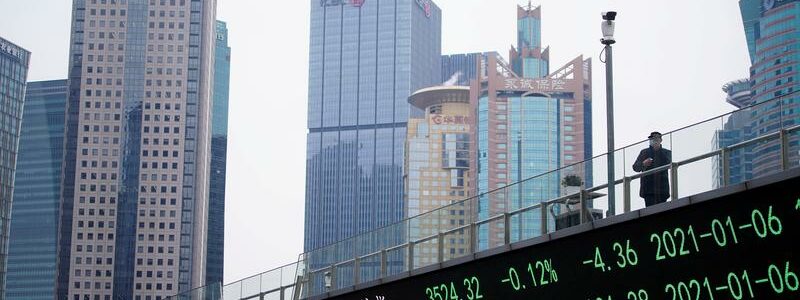
China stocks in correction on policy tightening, valuations
SHANGHAI (Reuters) – China’s benchmark Shanghai Composite index fell to the brink of correction territory on Tuesday, as investors worried that regulators could move to rein in frothiness in the market even as inflation fears grow.
As of Tuesday, the Shanghai Composite Index had fallen 9.98% from a Feb. 18 high, just shy of the 10% fall typically defined as a correction.
Other major indexes, including the blue-chip CSI300 index are already firmly in correction territory. The CSI300 closed at 4,970.99 points on Tuesday, down 16.1% from an all-time high hit on Feb 18. Shenzhen’s ChiNext has fallen 24% over the same period.
Graphic: China’s major stock indexes slumped into correction territory –
Traders and analysts said investors worry that liquidity could tighten even as China’s economic recovery shows signs of slowing.
China on Friday set a modest annual economic growth target of above 6%, significantly below the consensus of analysts.
Growth-oriented stocks have suffered globally in recent weeks from rising concerns over inflation.
In China, investor fears that authorities are keen to reduce generous stimulus policies have added to the pressure.
Consumer, healthcare, new energy and Hong Kong-listed tech firms, once fervently chased by investors, have been hardest hit. Some have slumped into bear market territory – a drop of 20% or more from recent highs – from lofty valuations.
The CSI300 consumer staples index lost 2.3% on Tuesday, down nearly 30% from a peak hit on Feb. 18, while the CSI300 healthcare index shed 3% and is down 26% from its peak.
In Hong Kong, the Hang Seng tech index, which includes tech giants Tencent, Alibaba and JD.com, fell 30% from a Feb. 18 record high.
Graphic: China’s consumer healthcare and new energy firms as well as Hong Kong-listed tech players fall –
A weaker yuan also added pressure to A-shares, as it could dampen the appeal of Chinese equities to foreign investors.
China’s yuan slid to a near 2-1/2-month low against the dollar on Tuesday before recovering.
Graphic: China’s yuan weakens against the dollar, adding pressure to stocks –
Foreign inflows into the A-share market via the Stock Connect have slowed in recent months and turned negative in March.
Graphic: Foreign inflows into the A-share market slowed in recent months and turned negative in March –
Domestically, Chinese investors’ margin lending to buy shares also decreased from a more than five-year high, as liquidity conditions tightened.
Graphic: Chinese investors’ margin lending to buy shares decreased –
However, some investors are ready to hunt for bargains, as China and Hong Kong stocks remain less expensive than global peers following recent declines.
“Investors tend to buy the dip after such sudden slumps,” said Liu Hongming, a fund manager at Beijing-based Dingxin Huijin Asset Management Company.
He said the rally for once high-flying sectors had probably ended for now, and that he prefers small and mid cap firms with solid earnings growth and low valuations.
Graphic: China and Hong Kong stocks remain cheeper than world peers –
Source: Read Full Article